From Bear Star Press (publisher of “poetry from western and pacific states”) comes local poet Christine Deavel’s debut collection, Woodnote. Deavel is co-owner of Seattle’s Open Books, one of the only two bookstores in the U.S. whose inventories are wholly devoted to poetry.
This beautiful volume, which won the 2011 Dorothy Brunsman Poetry Prize, is a quiet rhapsody on hidden or half-hidden things that often lie just outside our field of vision, and the unrecognized histories of such things. Formally a mix of free-verse lyrics with passages of spoken-voice prose, the poems have a spontaneous ease of the kind that comes only from well-practiced poetic craft.
Images in the first section of the book take the reader back to small-town life in the Midwest of half a century ago and more — the soil from which the poet’s childhood memories grew. There are root cellars, coal cellars, and switched-off porch lights that said, “We are done / with visitors now // and the one who should be home / is." Deavel often defines the things of this remembered life by what they are not: "Dragonfly in hover, / you are not a ghost / over the river // and the river is / not a ribbon / of memory.”
Some of the poems read like storyboards for animated films: "The starchy yarn of spring came / and knitted itself into a blue hyacinth / then unraveled that / and tatted itself into a columbine / then snipped it up / coated it in paste / and spread itself out to make a sky...”
The book isn't just a charming reverie, though. (As one of the poems says, “the thing / to be wary of” is “the dismissal hidden / in the ready assessment.”) Woodnote’s opening pages smooth over a land dark with old losses: "Knowledge is a covering snow. Below is the old understanding."
The understanding that unfolds in the later pages is of, among other things, a vast canopy of forest now gone, Indian tribes and birds that fled the land along with it, the deaths of family members, and the challenges of making a life. Many of the lyrics here are found poems from old books such as the 1892 edition of The Birds of Indiana. And here, what was cozy in the opening poems now has sharper edges: you’re “chinked / into your blankets / and pricked with radio light” while outside, a chrysanthemum “sips the dark / not for you.”
The wonderful long concluding poem, “Economy,” weaves passages of prose narrative and reflection with poetically arranged phrases from a diary kept for half a century by a distant relative who lived with family members on a farm and never married. The simple, repeated phrases of the diarist — she notes that she put up fruit for the winter, sewed a quilt, cleaned the cupboards, went to church, felt ill — are somehow riveting.
It's partly because the repetitions catch the ear like like a wild bird's song — like woodnotes, natural musical sounds. It's also because the poet is turning, this way and that, the question of what writing is and does: “Because she wrote out a bit of the day / she is the day / she makes the day.” Deavel mentions that someone called these diary entries “Precious,…and meant it derisively. I understand and have said it myself. But I’m sorry, sorry. Because now I’m thinking ‘cherished’ and how close, how close to ‘precarious.’” Through language we rebuild again and again, because it keeps coming apart, our sense of what a life is.
One prose passage describes a performance by local jazz pianist Jessica Williams: “tall and slender, her hair is straight and blonde-white, her voice when she speaks is a rustling — she looks like a sheaf of wheat.” The effect on the poet of Williams’ playing “involves precipices, sluices, and pools. She and the bassist and the drummer kept rinsing me with dipper water. They kept floating me boxes that I opened and became happy.” The poet says Williams told her audience that the music played during the performance was “a reason to be on this earth for more than breathing.”
Deavel’s continually surprising poetry is one of those reasons, too.
Christine Deavel, Woodnote (Bear Star Press: 2011), $16. Deavel reads on Saturday, Oct. 1, 7:30 p.m., at the Good Shepherd Center, 4th floor performance space, 4649 Sunnyside North (details here); on Thursday, Oct. 27, 7 p.m., at Elliott Bay Book Company, 1521 Tenth Avenue; and on Sunday, Oct. 30, 4 p.m., at Village Books, 1200 11th Street, Bellingham.


